Rad note » The text contained in this entry originally came from another entry. It was lifted and transferred here because the subject drifted far enough to warrant its own, separate entry.
(Search engines like it better when entries with different topics get their own separate page.)
At the end of this entry (that you are reading now) you will find a link to return you to the exact spot from which this entry was taken.
 Here ya go...
Here ya go...
» The Community College
Speaking of teaching .. I would like to share with you an article written about our community colleges ..
.. which I found very interesting .. titled » The Promise and Failure of Community Colleges.
Which basically says that » "a very large group of young Americans are not prepared, either financially, cognitively or socially, for that kind of education."
Because only ~8% of community college students transfer to a 4-year college (.. like the Film school girl did) ..
.. and only one third will earn a two-year degree within 6 years.
» Qualified to Comment
I have spent considerable time at community colleges .. mostly in California, so I feel qualified to comment.
Especially since both the dog and my brother went to Ivy league schools (Columbia & Yale). Both home-town schools.
You may find it interesting that roughly HALF of all students enrolled in college at any given time .. are studying at a community college.
Wow, that's a lot.
<ignore this intentional body-text marker>
••• today's entry continues here below •••
My favorite paragraph from the piece reads »
Perhaps the true challenge is even earlier, from birth to age 3 or 4, as the Nobel laureate (Economics) James Heckman (age 70) from the University of Chicago has been urging for years, when investments in cognitive and emotional capabilities have an enormous impact on children's future development.
Nicholas Kristof would concur. He breaks it down for you here. I like him. I like him a lot.
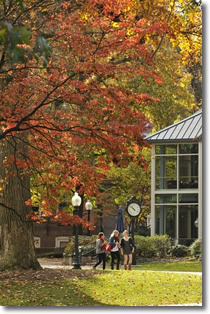 » Life-Enhancing Academic Prescription
» Life-Enhancing Academic Prescription
I have often thought over the years, knowing what I know now, about the courses that would most _enhance_ a person's life .. throughout his entire life ..
.. because now that I am a dad, you want to be able to guide your children in ways that will benefit them most. You want to share valuable advice.
For example, here are some courses that I find particularly worth taking. Hopefully you can see the wisdom in such courses:
- Philosophy » looking at the big questions (problematic questions) that life brings to us all (Wikipedia), More.
- Logic » formulating rigorous arguments that actually make sense using reason, and especially learning the logical fallacies, so you can recognize when someone if feeding you a bullshit argument
- Sociology » how you and I fit into the greater scheme of our culture(s)
- World Religions » what do billions of people believe?
- Astronomy » the stars, identifying the constellations, and how the sky changes over time
- Ethics & Morality » looking at tough questions of right and wrong. Exploring issues that would resonate with people like Pope Francis and Mandela and maybe even David Brooks.
- Humanities » art, including literature, music, and painting. Nobody says it better than Arnold.
- Economics » money, capital, you know
- Computer Science » since we live in the digital age. You know. Relevant to CS education.
- Programming » how to write programs that make a computer work for you. Rule the digital world. Because it's all in the algorithm. [ This article calls algorithms one of the deities of the Millennial generation. ] Have you seen the movie » Ex Machina? More.
- Poetry » because men die miserably every day for lack of what is found there. (Twenty-first century style).
- Psychology » why people do the seemingly crazy things that they do.
» Developing Social Skills (Soft Skillz) in the Twenty-First Century
I should probably mention that Claire says you will need social skills .. if you want to make serious bank .. citing Demings latest paper (August, 2015).
Claire's "Deming" is obviously not the management guru who died back in 1993, and who you might've heard of if you ever did any of that management stuff.
Yes, you will need social skills; that goes without saying. (You need social skills for more than just employment. You know.)
I have never heard of a class that teaches social skills. Have you?
Social skills is a big subject. But you basically want to be comfortable operating in ANY social environment in which you might find yourself. No?
I have participated in those personality-type programs, where a consulting group comes in and has you fill out questionnaires, which you also give to 4 or 5 people with whom you interact regularly.
It is fun stuff for sure, and quite revealing .. to learn what people think of you and your personality.
But the gist of the study is to teach you helpful tips to get along better with people who are different from us (.. including assholes).
Carnegie's How to Win Friends and Influence People (1936) is a great book along these lines. Chock full of practical, insightful advice. You could read that book multiple times and still not master all its techniques.
My own approach along these lines seem to be something like »
- know your shit (technically). become a student of what you do.
- work a little harder than your peers (tho not too much more or you will make them look bad and they will resent you for it)
- bite your tongue when you feel like grumbling about the way things are run (tho offer helpful advice in private where appropriate)
- make friends with the people who (have the authority to) make the decisions
Then be content to offer suggestion to them privately and let them run with them and do you best to help make your (boss(es) look good.
If your suggestions and advice and help is worth a shit . they will take care of you, my friend. Dont you fret none about it.
Getting to know people .. learning who they really are .. without judging them .. this is the essence of sociability, no?
Did you notice that Claire also references James Heckman (the Nobelist) who I mention up above?
Kudos to her, because I have never even considered the topic .. an obviously important topic.
Regarding Claire's reference to preschool .. I recall how it took two aides to peel my son off of me .. the first time I dropped him off there at preschool ..
.. while he was crying in severe distress. (For court-ordered drop-offs.) That fucked me up. Dazed-n-confused. Rips your heart out.
Which is why I can recall the moment so vividly .. like the emotional trauma of the pain is somehow seared deep into your soul. Most exquisite, I must say. (And not in the good way.)
Have you seen this, Claire?
Oh, look at this .. Claire Cain continues to kick ass. This is great stuff. An outstanding idea. An education within an education.
Exposure to other cultures. Talk about life-enriching.
Here she is again .. following up on social skills. She kicks ass. I like her.
» Coding in Kindergarten
Note that this interview with Eva Moskowitz, who is the founder of Success Academy Charter Schools in New York City says (at t=0:35 remaining) ..
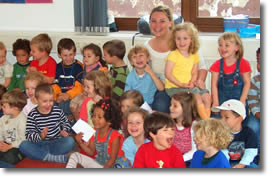 .. that all kindergarteners are given classes in coding. Wow.
.. that all kindergarteners are given classes in coding. Wow.
Double wow.
I just hope that they are also encouraging some rebellious, outside-the-box thinking.
Because our public education box has been sucking lately.
Oh, check this out.
< ignore this intentional text spacer >
Basic Goal-Setting Techniques for » All Students
I also feel that all students should be exposed to the basic principles and techniques of » Goal Setting ..
.. including the creation of tangible steps needed to achieve the goal and overcome the inevitable obstacle.
The first few times you walk thru the steps associated with Goal Setting, it can seem mechanical.
But soon enough you start to get the hang of it and can see the big picture more clearly.
I use the techniques associated with Goal Setting to learn the art and craft of » Writing.
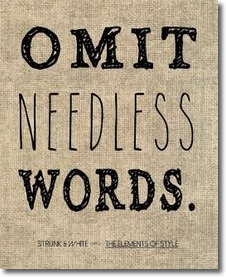 Which meant that I read a shitload of books on the subject.
Which meant that I read a shitload of books on the subject.
And I read after writers who are widely respected.
But most all, the writer needs to » write .. in order to develop his voice.
His own, personal voice. Unlike any other voice out there.
So that's what I did.
Every day, you learn a little more. Every day, you develop your craft and your sullen art a little more.
Periodically you break out of your comfort zone to challenge yourself with new things. Ever more difficult things.
Things you're not sure that you can pull off. And especially things that you are afraid to even attempt.
Then I started looking into (and exploring) the creative process.
Regarding education in general, I've always felt resonance with what is written in Proverbs » Wise men store up knowledge.
Here too, where it says » Make your ear attentive to wisdom.
Daniel says that God gave the four Hebrew children » "knowledge and intelligence in every branch of literature..."
Most of all I like what it says » here.
» Illuminate the Interface to the Digital World
I also feel that focus should be put on the interface to the digital world, which would include basic server administration, web design and scripting.
» The Importance & Value of Lifelong Reading
No discussion of education would be complete without at least mentioning the importance and value of a lifelong commitment to reading.
 I knew this Cuban guy named Big Al from the coffee shop.
I knew this Cuban guy named Big Al from the coffee shop.
He's the one who gave me a copy of Cormac's The Road. "I bet you'll enjoy this."
Big Al told me of an interesting program whereby he reads » two hours every day.
Preferably at the coffee shop.
A Cuban dude.
He reads whatever books happen to strike his fancy at the time. But usually he reads non-fiction, fact-based, scientific or historical books.
As you might imagine, Big Al was better educated than most Americans .. about a wide range of subjects.
You could have an intelligent conversation with him on any number of interesting topics.
In the back of Big Al's station wagon are cardboard boxes full of books he has read ..
.. which he cant quite bring himself to getting rid of. (Tho he came close a few times.)
Big Al is a walking example of the value of continued lifelong reading.
It is impossible to convey to someone what I am talking about. They will only understand when they spend time every day educating themselves .. long past when school lets out.
I am talking about going beyond the Common Core, Well beyond.
Matto's Mantra About » People & Books (Getting to Know Both)
Michael Matto was probably the most enthusiastically motivated person I have met. (Ever.)
 He is the one who turned me on to books and tapes on motivational topics,
He is the one who turned me on to books and tapes on motivational topics,
such as goal-setting and developing management skills.
By necessity, I needed to hone my time management skills,
cuz I was working 12-hour days at the plant and taking courses at the local community college.
Matto was famous for saying » "You'll be the same person five years from now, except for <masterful pause for effect> » the people you meet and the books you read."
From which one may draw many inferences .. but one of which is » you can meet people (get to know them rather well) thru their writings.
Obvious, no?
So the question becomes » who wants to be the same person in five years?
Speaking of reading and learning and being enthusiastically motivated .. this lady, Carol Dweck, a professor of Psychology at Standford ..
.. is supposed to be one of leading researchers on the subject of success and happiness.
She says to praise the students' process, not their ability.
» The Effect of the Columbia Core Reading Curriculum on the Student
My buddy the Dog, after he got out of the Navy, he got into Columbia university (in NYC).
At Columbia, they have an unusual program where the entire FIRST YEAR .. is spent reading many classical texts.
This is called the » Columbia Core Curriculum.
And I can tell you that I knew the Dog both before and after Columbia .. and the effect that the school had on him, the effect of the education, and particularly the effect of becoming familiar with all those classic texts ..
.. was dramatic. I could easily write a few paragraphs to characterize the changes that I witnessed, and I may indeed return later to do just such a thing. I'm sure I will.
[ One thing that stood out right away was » how humble he was. How understated.
And I remember thinking how my own academic tail feathers woulda surely been strutting about like a peacock or a rooster .. far more than he was doing.
He knew about so much really cool shit .. that you could have the most fascinating & engaging conversations with him. Really far-out shit.
Even after Columbia, he was still reading many books. He always had a fascinating stack beside his bed. I would pester him, asking, "What this one about, Dog? How about this one?"
One of the coolest things about the dog, and one that I have tried to emulate myself .. is how good he can make you feel about yourself.
He is just somebody who people like to be around. And he is very funny. With a leprechaun's sense of mischievous Irish humor.
I mean, out of all the fascinating characters that I met during the 6 years that I spent in the nuclear Navy .. he is the ONLY one that I am still in touch with.
Oh, look .. that's him calling right now.
Okay, I'm back. His mom just died of cancer. He was there. But she was old. She had lived a full life. (As a smoker.) His dad is still alive. Lives on the very next floor in a high-rise.
Dog craves the urban life. He cant sleep without the sound of sirens blaring all night long.
Anyway, I am very proud of the Dog. If you can't already tell. Especially after all that he has been thru.
He kicked ass in spite of .. not because of. If you feel me. ]
But for now, I will just say that it made him an impressive human being. I mean, the Dog is so impressive that merely standing near him makes you look good.
He was 6 years older (24 or 25) than most other students (18 or 19) .. so he may have gotten more out of the experience than his younger classmates.
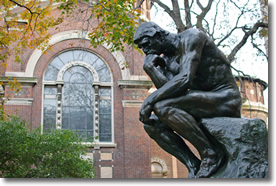 Basically, you read a text and think about (consider, ponder, contemplate, meditate upon) what you've read.
Basically, you read a text and think about (consider, ponder, contemplate, meditate upon) what you've read.
Later you go to class and discuss what you've read with your super-smart Ivy League classmates.
A professor guides the class in the exploration of the text's main theme(s) and the reason(s) for its historical and literary importance.
Does that not sound like a very cool thing to do? Very interesting. Enriching. Life enriching.
The Literature Humanities (LitHum) texts are » here. The Contemporary Civilization (CC) texts es aqui » here.
» David Denby Returns to Columbia Core 30 Years Later
I recall that David Denby, a Film critic at the New Yorker, returned to Columbia 30 years later and took the Core Curriculum classes all over again ..
.. and wrote about his experience in a piece called Great Books. I am trying not to feel jealous .. beyond the coolness of being a Film critic, which is one of the best jobs possible. Summary here.
His book at Amazon (1997).
[ Remind me to tell you the story about the Dog sleeping with his Writing Professor at Columbia. She gave him some special intensive tutoring. ]
» Building a Self
Up above I merely said that my opinion of the Dog AFTER Columbia was that he struck me as » impressive.
[ A true statement. ]
This is a good place to elaborate and say that .. you can probably now see why the following paragraph resonated so well regarding the Dog and the effect that Columbia had on him.
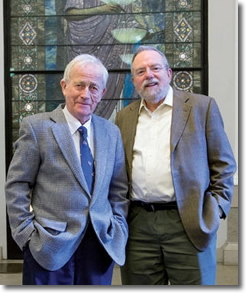 This is Denby writing about Professor Tayler speaking in class ..
This is Denby writing about Professor Tayler speaking in class ..
.. see here [ ~half-way down the page ] » Denby writes about going back to Columbia Core Curriculum.
"Don't get sucked in by false ideas," he said. "You're not here for political reasons. You're here for very selfish reasons. You're here to build a self. You create a self, you don't inherit it..."
You're here to build a self. Think about that.
If anybody would know, Tayler would.
The Dog had certainly built himself a self. I could see that.
A most impressive self. True that, what professor Tayler said.
(Dude, I hate to tell you .. but you're spelling your name wrong.)
I will vouch for the veracity of his statement.
Wallpaper & Books » Building Your Own Columbia Core SELF Starter Kit on the Cheap
Regarding Denby's 1997 book itself .. last I looked, a year at Columbia cost about $50- or $60K. Much as possible, Denby gives you, using his considerable skill set, his well-practiced skill set ..
.. he gives you an introduction to, and maybe even entrée into .. the value that your otherwise pricey tuition at Columbia would ordinarily buy .. would ordinarily cost.
Your very own Columbia university inspired, Ivy League-grade » Build-a-Self starter kit.
Find your favorite photos of Columbia and send them off to the wallpaper printer and cover your walls with the images. But save one wall for print-outs of all the book covers .. so you can X them out as you go.
Then get Denby's book and order the titles listed in the Core curriculum and lock yourself up in your Columbia university wallpapered room for a semester or two while you read all those books. And read them selfishly.
Build yourself a self on the cheap. Then you won't have to default on your student loans like Lee.
If you go into your wallpapered room and read all those books, I guarantee that you won't be the same person when you come out. You will feel far wealthier than just $50- or $60-thousand dollars richer .. and everybody around you will notice.
I am not saying it would be easy .. only possible. But a chance is all that some people need.
» Setting the Bar High
Update June 21, 2015 » I will return to discuss it later, but for now I merely want to mention and reference this very cool op-ed, titled » Closed Minds, Great Books.
Because he seems to be saying a similar thing .. tho admittedly, he says it much better. Which is why I want to look closer later.
The thing inside me that evaluates a writer and/or his writing .. rates this highly. Very highly. He is a true stud, writing with easy authority and confidence. I rarely feel that kind of respect. Like the Cormac kind of respect.
So I google the guy. "Who are you Mr. Arnold Weinstein and where did you learn to write like that?"
And I pull up his Wikipedia page and discover the guy died in 2005.
And the voice my head says » "Dude, this guy is one bad mo-fo. He is writing an op-ed in the New York Times from the grave .. from 10 years in the grave. Looks like he has set the bar pretty high .. doncha think?"
I will return to examine his op-ed later.
<end update june 22 closed minds, great books>
Update » It is now 2016. I have read nothing by Arnold since .. no other op-eds that he has written as a guest writer at the Times. Until today (Feb 23).
I was only into the second paragraph when, already, I could sense that this was no ordinary writer. (Even by the standards of the NY Times.)
So I looked up to see who was writing this thing and I saw his name and thought, "Oh, I know this guy. I remember him."
I dont want to get carried away here, commenting on Arnold's op-ed, or even his writing .. because I can see how easy it would be .. to get carried away.
But I knew while reading this piece that this was written by someone special. Someone deserving of respect. (Which is not a feeling that I get too terribly often.)
I can only imagine how cool it must be to sit in his class.
If I were king of the NY Times, I would say, "Dear Mr. Weinstein, Please feel free to contact us if you have more op-eds that you think our readers might enjoy."
Because this guy is the real deal. Through and through. Look at this passage, for example »
A new technology like GPS provides us with the most efficient and direct route to a destination, but it presupposes we know where we are going. Finding an address is one thing; finding one's way in life is another. Even our smartest computers or most brilliant statisticians are at a loss when it comes to mapping our psychic landscapes.
Even beyond his writing, which is beautiful .. he totally nails the content .. spelling out the obvious for you and me.
I am actually curious about his life story .. how he came upon such a self.
A part of me actually loves this guy .. and I know so little about him .. beyond what he has written in these two columns. There is almost a sense of reverence that I feel.
Is it just me? Or do you not read his article and say, "This guy totally gets it." He gets the big picture of life. Especially where so many today are missing it.
He is saying » "Dont get so caught up in going where you're going .. without ensuring that it's a worthy destination."
I wonder if he has seen Woody Allen's Irrational Man?
<end update feb 23, 2016, arnold's column again jumps out at me>
» Biographies Give Me the Biggest Reading Boners
My *favorite* thing to learn about is/are biographies. (Nate, too.) People's lives. Interesting people .. who both challenge us and inspire us with their ideas and lives to live a little bigger.
I have never seen such a class offered. For example, I have never seen a class on (the bio of) Tolstoy or Einstein or Dostoevsky, which I would love to take.
[ I have not read it, but Boswell's Life of Samuel Johnson (1791) is said to be the best biography in the English language. ]

The first two books I ever checked out at the library [ where mom was the library queen ] were two bio's » one on Babe Ruth and one on Custer. i loved the one on the Babe. But the book on Custer, eh » not so much.
I like to learn about the period in which they were living. The culture.
Probably the coolest thing about studying the lives of certain people is that .. you get to live their lives alongside them, so the speak. Which, in itself, con be transformative.
A wise man once told me » choose the professor, not the course. A good professor does indeed make a world of difference. True that.
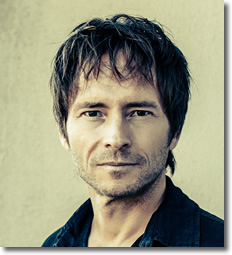 » Edward Frenkel | Berkeley Mathematics
» Edward Frenkel | Berkeley Mathematics
Speaking of choosing the professor .. and on the topic of teaching, in general .. this guy at Berkeley fascinates me.
I would definitely be interested to see what it is like to sit in on his classes.
I mean, you never know, it might not be as cool as I imagine it would be.
Sort of like what I imagine it would be like to sit in on one of Stiglitz's classes.
He has that air of coolness that I first noticed with Dr. Wolf, who was from NYC.
In addition to the Berkeley professorship, Frenkel is also a member of the Academy of Arts & Sciences (.. the people who vote for the Oscars)
So there is definitely a coolness factor there.
But Frenkel writes shit (good shit) from time to time, articles, various pieces on the topic of math.
I havent read his book. Love and Math. Tho lots of praise makes me want to.
And I can feel my juicey-juice juicing. Stimulating and thought-provoking ideas .. that really get you going.
For example, in the second paragraph here, he writes » "Is our belief in a definite, objective, observer-independent reality an illusion?"
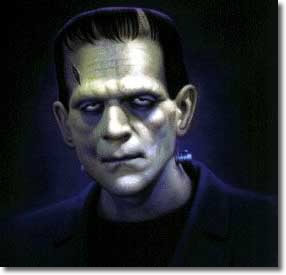 Later, a few paragraphs from the end, he gives your skull a pleasantly-sharp torque when he answers this question by writing »
Later, a few paragraphs from the end, he gives your skull a pleasantly-sharp torque when he answers this question by writing »
» Does the wave function directly correspond to an objective, observer-independent physical reality, or does it simply represent an observer's partial knowledge of it?
If the wave function is merely knowledge-based, then you can explain away odd quantum phenomena by saying that things appear to us this way only because our knowledge of the real state of affairs is insufficient.
But the new paper in Nature Physics gives strong indications (as a result of experiments using beams of specially prepared photons to test certain statistical properties of quantum measurements) that this is NOT THE CASE. If there is an objective reality at all, the paper demonstrates, then the wave function is in fact reality-based. <end frenkel quote>
In other words, of the three possibilities of reality, we now are getting indications that it aint the one we were betting on.
Tho I would be remiss if I did not include these few concluding paragraphs »
» What this research implies is that we are not just hearing different "stories" about the electron, one of which may be true. Rather, there is one true story, but it has MANY FACETS, seemingly in contradiction, just like in "Rashomon." There is really no escape from the mysterious -- some might say, mystical -- nature of the quantum world.
But what, if anything, does all this mean for us in our own lives? We should be careful to recognize that the weirdness of the quantum world does not directly imply the same kind of weirdness in the world of everyday experience.
That's because the nebulous quantum essence of individual elementary particles is known to quickly dissipate in large ensembles of particles (a phenomenon often referred to as "decoherence"). This is why, in fact, we are able to describe the objects around us in the language of classical physics.
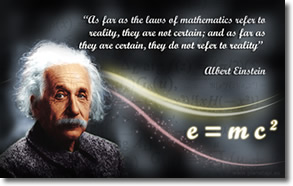 That shit fascinates me. Gives me such an intellectual boner.
That shit fascinates me. Gives me such an intellectual boner.
Compare Frenkel's piece with Einstein's quote posted here.
The end. ■
Update - On the subject of education in general, and life-enhancing classes with the best professors in particular » this is interesting.
This, too. ■■
Feynman's Lectures on » QED
On the subject of outstanding teachers and learning very cool shit ..
I have begun listening to Feynman's series of 30 videos .. based on 4 lectures originally given in 1979 in New Zealand, and then again in 1983 at UCLA .. on QED, or » Quantum Electro-Dynamics.
Which were published in a book (1985) titled » QED: The Strange Theory of Light & Matter.
I soo feel like I am stealing fire from the gods, listening to these lectures.
Call me crazy, but I intuitively feel that the insights contained in this course, this theory, provide insights into how the spiritual world works.
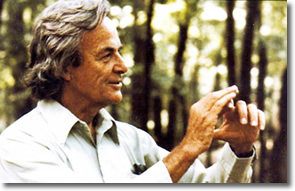 He is a good teacher. Gifted, even.
He is a good teacher. Gifted, even.
Funny. Almost enchanting.
He reminds me of Dr. Wolf, another New Yorker. (Feynman was from Queens.)
I learned about these lectures from Egan.
I figured » "Hey, Egan is a smart fucker. Where is he learning this stuff?" Now I see.
And I only listened to a little of the first lecture .. and already his ideas are haunting me.
For example .. he said that » as we study and get smarter and learn more about how the world works .. we often learn that ..
.. we learn that two seemingly separate things are » really two separate parts of the SAME thing (.. such as electricity and magnetism, and also space and time).
Think about it.
Think about the cosmic implications of such a thing.
 It can really send your mind off ..
It can really send your mind off ..
.. running at Porsche speeds down the back roads of Pennsylvania.
Feynman died of abdominal cancer in 1988.
He helped Oppenheimer build the bomb. And he helped a lot, too.
Feynman was born in 1918. That makes him 24 years old in 1942, when the project began. [ WGN mini-series ]
The end. ■■■ .. of Feynman's QED lectures & book.
You can return to the exact spot from which the text in this entry originated .. see » here.
[ Told you that I would provide a link back. Compliments of Rad's world-famous hyper-linked shuttle service. ]
» John Nash A Beautiful Mind Dies at 86
Update May 24, 2015 » John "A Beautiful Mind" Nash died at 86. He won the Nobel prize in Economics in 1994 for early contributions to » Game Theory.
Which has a nice resource web site.
Based on von Neumann's pioneering work.
<ignore this intentional text spacer>
<ignore this intentional bottom text spacer, too>

